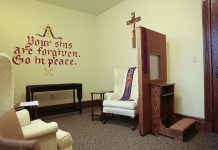
by Marlene Sweeney
Sacramental preparation plays a significant role in the life of most Directors of Religious Education.
Creating, planning, teaching, and implementing a vision of sacramental formation for both adults and children in your parish family are important parts of your ministry. Every community seems to tackle these challenges in different ways depending on resources and parish styles.
From Ritual to Lifestyle
One factor that appears to remain consistent is the hope that somehow the participants are led beyond the celebration of Sacraments and are given the tools and encouragement to live out the meaning of the Sacraments in their daily lives. What can we do to encourage this shift in emphasis from one-time rituals to lifestyle? How can we offer practical actions to help families make connections between what happens in church and what happens at home? How do DREs support catechists and parishioners to enable them to live out their sacramental lives in the larger community?
Drive-By Church?
Several years ago I met a young man at a local restaurant who identified me as “the church lady” who helped him prepare for his First Communion. He seemed pleased to see me and described to his companion a rather romantic version of what his life had been like during that time of formation.
“I used to get dropped off every week after school,” he told his friend, “to meet with this nice lady and a few other kids, and we would go in this big church and she would show us all this stuff and explain what the priest did with it all.”
The young man had memories of sights, sounds, and smells that caused me to pause and reflect on what appears to have been a God moment for him. As for me, all I remembered was a group of older children that needed to meet for sacramental preparation in addition to attending class.
After this young man’s poignant sharing, I felt compelled to ask him where he was today in his faith life. He mumbled something about his mother never taking him to church and life moving on. I could feel his discomfort with my question. I felt sad. Not wanting to end our chance meeting on a downer, I reminded him that he was welcome to come back now that he was obviously able to make decisions for himself. He smiled as if he never thought of that!
A Small Starting Place
Most DREs acknowledge the fact that attendance increases in children’s programs the year (or required years) of sacramental formation and falls off following the reception of the Sacrament. Families will generally comply with individual parish requirements to be sure that their children celebrate Sacraments.
The fact that Sacraments are of value to these parents speaks to a small starting place where we as Church need to enter. How do we help families recognize that knowledge of faith and living the faith is a lifelong process?
What’s In It for Me?
Parents today are bombarded with media messages reminding them to stay current on many facets of their children’s lives: nutrition, safety, and health concerns. Would good parents even suggest that they will ignore their children’s health or diet and let their children decide later how to care for themselves?
Yet, parents regularly express such sentiments in regard to their children’s faith development. Why is that an acceptable course of action? How will the young ever come to be initiated into the life of the Triune God if they are never given the opportunity to know God and a community of believers?
Perhaps what we experience is the result of the parents’ own lack of an articulate faith life and hence their tendency to feel bankrupt in providing for their children. They themselves have not done the hard work of growing in their faith as adults and so cannot embrace the importance of their children living a vibrant communal life centered on Christ. Our sacramental prep efforts clearly need to focus on the adults.
Sacramental Intensives
The time of preparation can be relatively short. Engaging entire families is complex, but ideal. Work for the ideal! Offer opportunities—as many as possible—to gather as a community to learn, pray, work, and play together. Spend little time focusing on the culmination of this prep and a lot of time on the process.
Families often need to engage in a wide array of activities in order to grow in their familiarity and comfort with the church community. Purposefully proposing that “this time of formation” is all about getting to know God, ourselves, and the community is a legitimate goal. Inform families that they will be getting e-mails or flyers on a regular basis that will invite them to come together to deepen their understanding of what they are seeking in this sacramental journey.
The Open-Door Policy
Encourage your catechists to develop an open-door policy for parents the entire year of preparation. Prepare take-home packets on different theological issues of interest and display them wherever parents gather. Offer as many good websites, DVDs, and resources as you can find to share with whomever is interested.
Establish the expectation that when it comes to our faith, we are all lifelong learners, and that it takes an entire community to help us live a sacramental life. We count on each other and God to lead us in living our faith.
Marlene Sweeney, M.Ed., MA, is a Certified Pastoral Associate in the Archdiocese of Chicago. Marlene is a writer and poet whose works have appeared in numerous books and periodicals. E-mail Marlene at mcsjames@yahoo.com.
Copyright 2010, Bayard, Inc. All rights reserved. This article is protected by United States copyright and other intellectual property laws and may not be reproduced, rewritten, distributed, redisseminated, transmitted, displayed, published or broadcast, directly or indirectly, in any medium without the prior written permission of Bayard, Inc.
This article was written by the Catechist Staff and appeared in Catechist magazine, December 2010.
Image Credit: Zolnierek/Shutter Stock 592148795




